- You are here:
- Home »
- Oven Recipes
- » The Perfect Hamburgers: The Oven Recipe
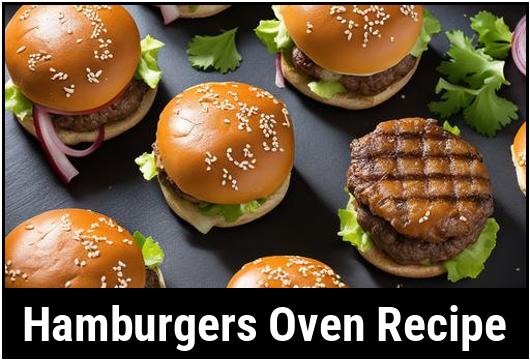
The Perfect Hamburgers: The Oven Recipe
Are you tired of the same old grilled hamburgers and looking for a new way to cook them? Look no further! In this comprehensive guide, we will explore the art of making delicious hamburgers using an oven. Prepare to be amazed as we delve into the food science, culinary details, selection, cleaning, preparation, tips, variations, doneness checks, recipe, and more.
The Science Behind the Juicy Burger
To understand how oven-cooked hamburgers can turn out juicy and flavorful, we need to examine the food science at play. When cooking a hamburger, two key processes occur: Maillard browning and the denaturation of proteins.
Maillard Browning
The Maillard reaction is responsible for creating that appetizing brown crust on the surface of your burger. When proteins and sugars react at high temperatures, a cascade of complex chemical reactions occur, resulting in the generation of deliciously rich flavors and aromas. Unlike grilling, an oven provides a controlled heat distribution, allowing for an even development of the Maillard reaction throughout the patty.
Protein Denaturation
Protein denaturation, on the other hand, is the process where the proteins in the meat unfold and rebind together during cooking. This process contributes to the overall texture and tenderness of the burger. Oven cooking ensures that the heat penetrates evenly, promoting uniform protein denaturation and resulting in a juicy, succulent patty.
Selecting the Right Meat for Your Burger
When it comes to making hamburgers, selecting the right meat is crucial for a flavorful outcome. Ideally, you’ll want a blend of ground beef that contains a combination of lean and fatty cuts. A good balance is 80% lean beef and 20% fat. This allows for the perfect balance of tenderness and flavor.
Cleaning and Preparing Your Oven
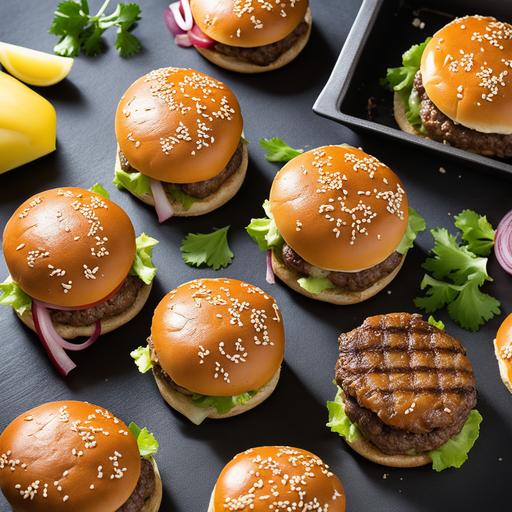
Before diving into the burger-making process, it’s essential to ensure your oven is clean and ready for action. Start by removing any crumbs or residue from previous cooking sessions. Wipe down the oven racks and walls using a damp cloth or sponge. Remember to avoid using harsh chemicals that may leave behind unpleasant odors. A clean oven guarantees a clean final flavor in your burgers!
Preparing the Burger Patties
Now that your oven is ready, let’s move on to preparing the burger patties. Begin by gently mixing the ground beef, ensuring you don’t overwork the meat as it can make the patties dense and tough. Season the mixture with your choice of spices, such as salt, pepper, garlic powder, or even a hint of paprika for an added kick.
Tip: Enhance the Flavor with Additions
If you’re feeling adventurous, you can add various ingredients to your burger mixture to elevate the flavor. Try finely chopped onions, minced garlic, Worcestershire sauce, or even your favorite cheese. These additions infuse the burgers with extra taste and appeal.
Shaping and Forming Perfect Patties
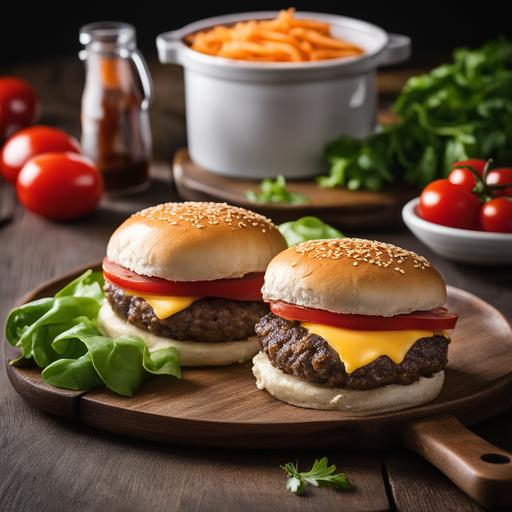
To achieve uniform cooking, shaping the patties correctly is essential. Divide the seasoned meat mixture into evenly-sized portions. A common mistake is to press the patties too tightly. Instead, gently shape them into round discs about ¾ to 1 inch thick, using your hands or a burger press. Be sure to create slight depressions in the center of each patty to prevent it from puffing up during cooking.
Variations: Experiment with Different Shapes
While round-shaped patties are the classic choice, don’t be afraid to experiment with different shapes. Square or oval patties can add visual interest to your dish. Just ensure the thickness remains consistent across all shapes to ensure even cooking.
Doneness Checks: The Key to Perfect Burgers
When cooking hamburgers in the oven, it’s important to check for their doneness. Undercooking or overcooking can lead to an unpleasant eating experience. Here are some tried-and-true methods to ensure you achieve the desired level of doneness:
Internal Temperature: The Failsafe Method
Using a meat thermometer is the most reliable way to check the internal temperature of your burgers. For medium-rare patties, aim for an internal temperature of 135°F to 140°F (57°C to 60°C), while well-done burgers should reach 160°F to 165°F (71°C to 74°C).
The Finger Test: A Sensory Approach
If you prefer a hands-on approach, you can use the finger test. Gently press the center of the patty, and based on the resistance you feel, you can estimate its level of doneness. However, it takes some practice to become proficient in this method.
Visual Indications: A Last Resort
As a last resort, you can assess the doneness visually. Cut a small slit into the center of the patty, ensuring not to squeeze out all the flavorful juices. Observe the color in the center; pink signifies a medium-rare patty, while no pink indicates a well-done burger.
Baking Your Hamburgers to Perfection
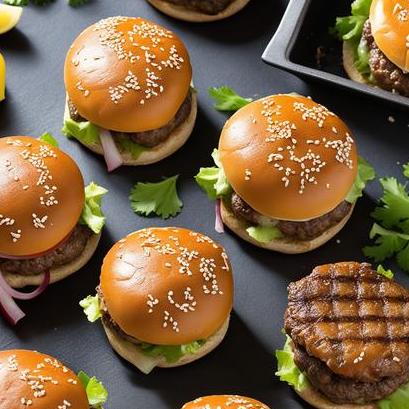
With your prepped patties and a clear understanding of doneness checks, it’s time to dive into the oven cooking process. Preheat your oven to 400°F (200°C) to ensure even heat distribution throughout the cooking time. Place the shaped patties on a lined baking sheet, ensuring a small gap between them for proper air circulation.
Tip: Elevate the Burgers for Even Baking
For enhanced cooking performance, consider placing a cooling rack on top of the baking sheet. This technique allows the heat to circulate more effectively underneath the patties, resulting in a consistent browning.
Cooking Time: Achieving That Perfect Juiciness
The cooking time may vary depending on the thickness of your patties and the desired level of doneness. As a general guideline, for ¾-inch thick patties, allow them to cook for approximately 8-12 minutes for medium-rare and 12-16 minutes for well-done. Remember, these are estimates, and it’s crucial to check the internal temperature for precision.
Overcooking and Undercooking: Avoiding Mishaps
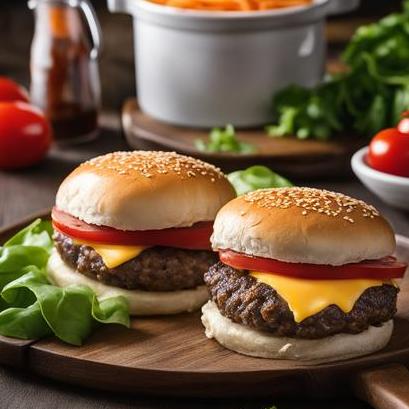
Overcooked or undercooked burgers can be a tragic outcome, but fear not! With oven cooking, it’s easier to maintain control than with other methods. If you observe the burgers are cooking too quickly or browning excessively, you can lower the oven temperature by 25°F (15°C). Conversely, if you notice they are not browning enough, you can increase the temperature slightly.
Tip: Utilize the Broil Function
To give your burgers a delightful, crispy crust without overcooking the interior, you can utilize the broil function. After the patties are almost cooked through, switch the oven to broil mode for the final minutes. Keep a close eye on them to prevent burning, as the broil function works rapidly.
Cleaning Up After Burgertime
Once your burgers are cooked to perfection, it’s time to enjoy the fruits of your labor. But before you indulge, don’t forget to clean up your cooking area. Wash any utensils or dishes used in hot, soapy water, and wipe down any countertops or surfaces that may have encountered raw meat. Proper hygiene habits ensure a safe and enjoyable dining experience.
A Classic Burger Recipe: Simple and Delicious
Now that we have covered the science, preparation, cooking, and clean-up, let’s dive into a classic hamburger recipe that will leave your taste buds craving more.
Ingredients:
-
1 pound (450g) ground beef (80% lean, 20% fat)
-
Salt and pepper to taste
-
Hamburger buns
-
Optional toppings: lettuce, tomato, onion slices, cheese, pickles, condiments of your choice
Instructions:
-
Preheat your oven to 400°F (200°C).
-
Gently mix the ground beef, ensuring not to overwork the meat.
-
Season the mixture with salt and pepper, incorporating the seasoning evenly.
-
Divide the mixture into equal portions and shape them into patties, around ¾ to 1 inch in thickness.
-
Place the patties on a lined baking sheet, allowing space for air circulation.
-
Bake in the preheated oven for approximately 8-12 minutes for medium-rare and 12-16 minutes for well-done. Use a meat thermometer for precision.
-
Optional: During the last few minutes, switch to the broil function for a delightful crust.
-
Remove the burgers from the oven and allow them to rest for a few minutes.
-
Assemble your burgers on buns, adding your favorite toppings and condiments.
-
Serve immediately and relish in the delectable flavors of your oven-baked hamburgers!
Conclusion
Congratulations! You are now equipped with all the knowledge and step-by-step instructions to make mouthwatering hamburgers using your oven. By understanding the food science, selecting the perfect meat blend, and following the cooking tips, you can elevate your burger game to new heights. Enjoy the process, experiment with variations, and share the joy of a homemade, oven-baked hamburger with your loved ones. Happy cooking!
Sources
FAQS On Hamburgers Oven Recipe
What Ingredients Do I Need To Make Hamburgers In The Oven?
To make hamburgers in the oven, you will need ground beef, breadcrumbs, egg, minced onion, salt, pepper, and any additional seasonings or toppings of your choice.
How Do I Prepare The Hamburgers For Baking In The Oven?
Start by preheating the oven to 375°F. Then, mix the ground beef, breadcrumbs, egg, minced onion, salt, and pepper in a bowl until well combined. Shape the mixture into patties and place them on a greased baking sheet.
How Long Do I Need To Bake The Hamburgers In The Oven?
Bake the hamburgers in the oven for about 15-20 minutes, or until they reach an internal temperature of 160°F. It’s important to check the temperature with a meat thermometer to ensure they are fully cooked.
Can I Add Cheese To The Hamburgers While They Are Baking In The Oven?
Yes, you can add cheese to the hamburgers during the last few minutes of baking to allow it to melt and become gooey and delicious.
What Are Some Recommended Toppings For Hamburgers Made In The Oven?
Some popular toppings for oven-baked hamburgers include lettuce, tomato, onion, pickles, ketchup, mustard, mayonnaise, and barbecue sauce. You can also customize your hamburgers with avocado, bacon, sautéed mushrooms, or any other toppings you enjoy.


